Bee Workshops For Families
We have collected lots of information and a huge enthusiasm for bees. We wondered how we could pass this on to others? That's why these workshops are so cheap: we are not in it to make money, just to share the knowledge.
Gill got to thinking and in an idle moment wondered out loud on a home educating internet list 'whether a few children might be interested' in a small natural honeybees workshop. Literally hundreds of people came to our workshops in the first year. As a consequence, we run bee workshops each year. These workshops are not restricted to home-educated participants!
Friendly, Informal, Interesting and Cheap
The idea is to give some insight into our approach to beekeeping and the thinking behind it. That's why these workshops are so inexpensive: we are not in it to make money, just to share the knowledge.
Beginning at 11.00am, we plan to finish before tea-time, with a break around 12:30 (bring a packed lunch). However, this is not a five-hour endurance test! The session is broken down into (roughly) half hour chunks, with other activities between each section.
Is This For Us?
For anyone with an interest in bees, this is for you. There are no preconditions or requirements. You may have no knowledge of, or experience with bees, or plenty. We have found that children who are interested in bees find the whole workshop fascinating.
This isn't a training course for beekeepers (we can run one for you: please get in touch to arrange details), but some previous participants have gone on to keep bees themselves.
Our approach is very different to that promoted by the British Beekeepers Association and their beekeepers training schemes. In some respects our views and attitudes are the opposite of theirs.
Amongst other topics, in this workshop we cover:
- the history of bees and beekeeping
- the life cycle of honey bees
- bees' role in the world
- honey bee products
- environmental and other pressures on bees
- how we can help bees
Although the bees may not be flying out for forage, depending on the weather, there will be opportunity to see them in a hive (through a window) and you will be able to handle some wax comb that they have made.
We've found out as much as we can about keeping bees naturally (and we have much more to learn!)
Seed Packets
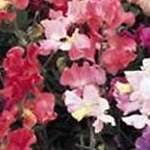 Sweet Pea
Sweet Pea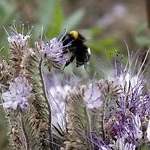 Phacelia
Phacelia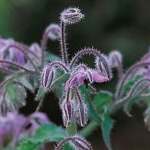 Borage
Borage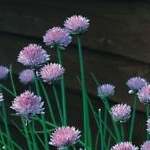 Chives
Chives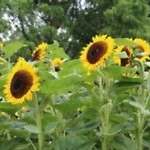 Sunflower
SunflowerParticipants in the bee workshops get some seeds to grow to help the bees. Varieties vary by availablity and the season
Typically Sunflowers, Phacelia, Sweetpeas, Chives and Borage. All nice flowers, attractive to bees and other pollinating insects.
The seeds are quite large and easy to grow. Sow them in pots or trays on an indoor windowsill then transplant them into bigger pots (or the garden) when they are large enough to handle.
Or sow them direct where they are to grow. Protect from late frosts and watch out for slugs and snails.
Phacelia is often used as a 'green manure' which means it can be grown in large areas and dug into the nourish the soil before it flowers. So sow it where you don't mind lots of it and leave it to flower for the bees. The bees will love it!
You may want to grow the seeds in pots or window-boxes so you can keep an eye on them. The sunflowers will grow quite tall.
Lip Balm
There's an opportunity to make some lip balm using beeswax (from our hives), organic shea butter and organic coconut oil.
Seed Bombs
We made some seed bombs in the workshops. A small (1cm diameter) ball of clay and compost, containing wild flower seeds. Once dried, drop these in appropriate places where they can plant themselves.
Wild flowers are important for wildlife. With a bit of luck, the seeds in the seedbombs will grow into plants and set seed themselves, starting generations of bee-friendly plants.
Best not to lob seed bombs into your neighbour's garden; they may not be pleased. A patch of ground in your own garden, a pot, or a little corner you know of where you can watch them grow would be best.
You can find instructions on how to make your own seed balls on the internet or buy them from www.seedball.co.uk
Honey
We have a little honey to taste. We only collect honey when the bees have some to spare. This honey is the real thing: made by bees that are never fed on sugar, so it is unobtainable anywhere else.
Meeting the Bees
Keeping Safe
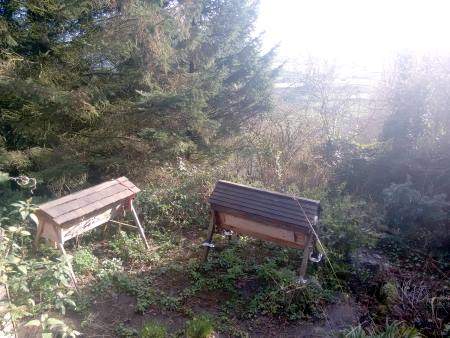
We cross the road. Take care. There are steps that are a little uneven and may be slippery.
We take small groups to see the bees flying. The hives each have a viewing window on the side, so we can peek in to see what they are up to inside their home.
It is important to remain calm. The bees don't like it if you flap about. Even in the summer, I wear a woolly hat to stop bees getting tangled in my hair. I recommend that you bring a hat you can tuck all your hair into. Iain has very little hair, so he doesn't need to bother with this; they just bounce off!
Our bees are locally born and bred, so they are well used to the Yorkshire weather. They will fly even on cool, damp days or even in light rain. If it is a day with heavy rain, when you visit they may not be flying. We can still take a little look through their window as they will be busy doing inside jobs.
If you are nervous about meeting the bees or are allergic, all is not lost. You can watch the bees on the solar powered webcam from inside the cottage. Or you can stand at the bottom of the steps and watch from there.